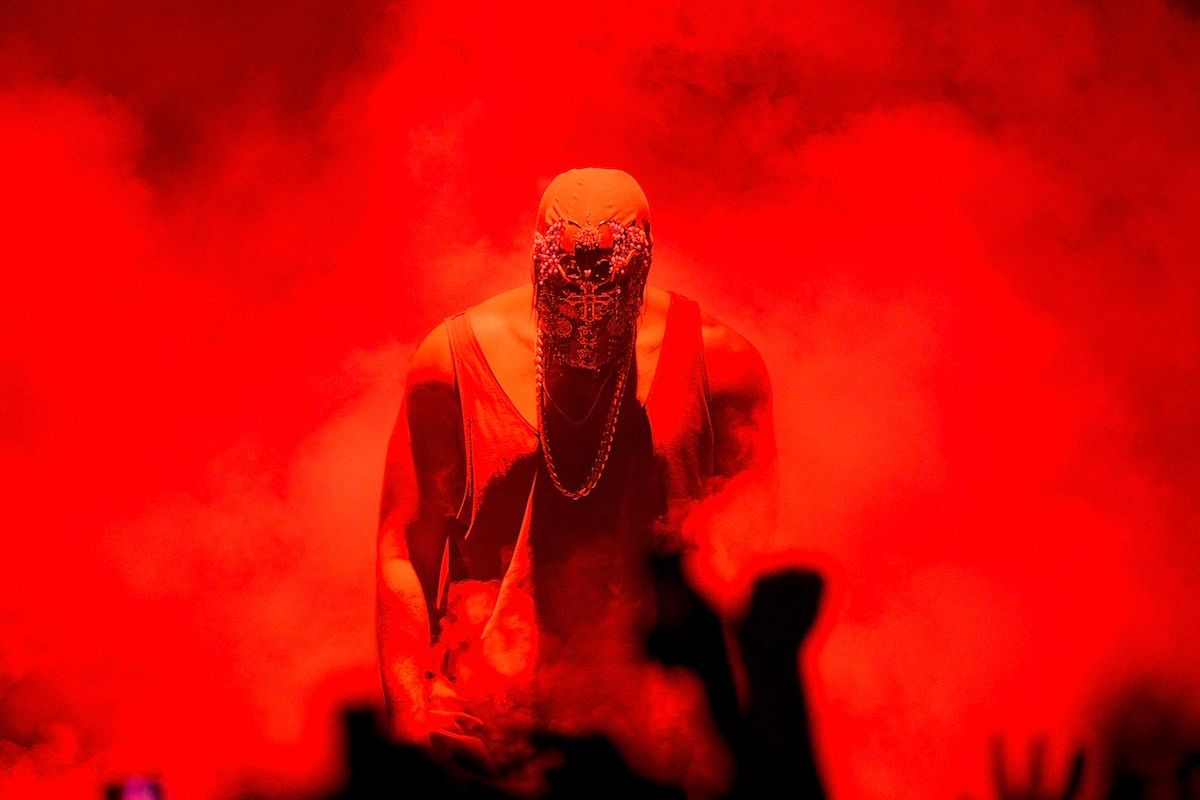
Kanye West Yeezuz
Photo Credit: Bradley Kanaris/Getty Images)

Pablo Picasso famously said: “Every act of creation is first an act of destruction.” With that said, arguably, no record follows this philosophy more enthusiastically than Kanye West’s Yeezus.
While 2010’s My Beautiful Dark Twisted Fantasy was grandiose rap built around maximalist compositions, the very first thing we hear on 2013 follow-up Yeezus is a TB-303 synthesizer that’s so distorted it sounds like it’s letting out a death rattle. As Kanye taunts: “How much do I not give a fuck? / Let me show you right now before you give it up!” it’s clear he’s taking great pride in violently ripping apart the script to a magnum opus, much like The Velvet Underground (White Light / White Heat) and Radiohead (Kid A) before him. But to only label Yeezus as an act of self-mutilation would be lazy.
Yeezus is about finding beauty amid the chaos. Sure, there are times where the discord of "On Sight" becomes jarring and uncomfortable to listen to, yet in a flash Kanye takes us somewhere magical with an inspired sample. He does the same thing on “New Slaves,” which, at the 2:50 second mark, trades its gnarled anger towards the fashion industry for Frank Ocean vocals and an obscure Hungarian rock sample, both of which sound transcendently beautiful. Yeezus is Kanye working his way through the darkness of capitalism (“New Slaves,” “I’m A God”) in order to reach the light (the fact the record closes with the soulful clarity of "Bound 2" isn’t a coincidence). It’s the Apocalypse Now of rap albums.
With its post-punk sonics and absurd lyrics (at one point Kanye boasts “I stuck my fist in her like a civil rights sign”) — Yeezus is often misunderstood by hip-hop critics, with personalities such as Charlamagne tha God finding it hard to understand how Kanye could have shifted so far away from the soulful samples and playful storytelling he won us over with. But we should applaud Mr. West for not adhering to the status quo.
Years after its release and Yeezus still sounds exhilarating. You can hear its impact on the bass-driven experimentation of A$AP Rocky’s Testing and the strange synths present on Frank Ocean’s Endless. The punk rock leanings of “Black Skinhead,” meanwhile, are the birthplace of the riot-inducing stage personas of Travis Scott and Lil Uzi Vert. The touching Nina Simone "Strange Fruit" sample and thumping No Limit-esque horns of “Blood On The Leaves” remain some of Kanye West’s most inspired moments as a producer.
However, this album also marks the start of Kanye West's transition into the Trump-supporting reactionary we sometimes cringe at today. On Yeezus, Kanye seems to have realized making listeners feel uncomfortable is an emotion every bit as valid as making them feel secure. Subsequently, its songwriting doesn’t always make sense as it seeks to echo the uneven subconscious of its creator.
Yeezus isn’t grounded in deep introspection, but rather music designed to make you feel something deep in the pit of your stomach. The fact 2018 Kanye is a disciple of anarchist comedian Andy Kaufman can be traced right back to Yeezus as around the time of his sixth solo album, West stopped caring about the validation of his peers. Like Kaufman, he realized his only duty as an artist was to make people feel something, whether that ends up being love, anger or disgust (such as tour merch built around the Confederate flag) is ultimately irrelevant.
Yeezus also gave birth to a new approach in the studio. Much like Velvet Underground’s dark masterpiece White Light / White Heat, which was recorded in just 48 hours, Yeezus was created in a small time frame, where minimalist creativity superseded indulgence. “It’s probably the fastest record we ever made,” admitted West’s frequent engineer Anthony Kilhoffer in an interview with Pitchfork, with Kanye realizing that in order for something to sound authentically raw and primal he couldn’t spend Dr. Dre-level periods in the studio polishing it. Life of Pablo and Ye have continued this hurried philosophy, but Yeezus was the only moment where Kanye West perfected it.
For me, Yeezus’ greatest moment is “Send It Up”. Track nine is by far equal parts unhinged, industrial techno and murderous trap anthem; the perfect example of how Kanye splices different sounds together in order to create something truly original. The fact it features Chicago’s King Louie, an underground gangster rapper, who sits just outside of the mainstream, also represents an underrated aspect of Kanye West’s legacy; namely, the way in which he consistently gives an unexpected platform to new artists (peep 070 Shake’s star-making turn on Ye’s “Ghost Town”).
“Send It Up” remains special because Kanye, who enthusiastically raps about riding around on his “bodyguard’s back like Prince in the club,” is having so much fun despite the world crashing and burning around him. Or, as noted Yeezus fan Lou Reed more eloquently put it: “Kanye stays unmoved while this unsettling mountain of sound grows around him. No one's near doing what he's doing [on Yeezus], it's not even on the same planet."
__
Thomas Hobbs is a freelance culture and music journalist from the UK. His work has appeared in the Guardian, VICE, Financial Times, Dazed, Pitchfork, New Statesman, Little White Lies, The i and Time Out. You can find him on Twitter: @thobbsjourno.